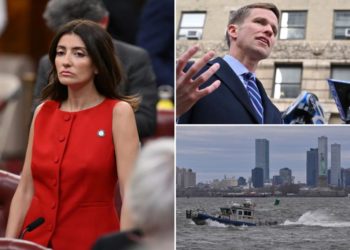In an emotional Tuesday afternoon meeting, outgoing 60 Minutes executive producer Bill Owens reportedly expressed concerns to staff that the venerable news program was losing its independence, a scenario playing out as CBS News parent Paramount is reportedly in talks to settle a lawsuit of dubious merit brought by President Donald Trump. “The company,” Owens told his team, according to the Times, “is done with me.”
In four days, CBS News staffers will gather for a more festive occasion: the White House Correspondents’ Dinner. The network is hosting a Saturday pre-party with Politico, one of a flurry of fêtes and boozy brunches sponsored by news outlets and talent agencies that will take place at Washington hotels and hot spots, ambassadors’ residences, and backyard gardens. But alongside this year’s celebration of the First Amendment are reminders of just how much press freedom is being challenged in a second Trump term, involving everything from White House access restrictions to free speech threats.
“We’re in for a wild ride in terms of the games they’re going to play,” one political reporter told me, referring to the administration. The “guardrails are gone” in this second term, the reporter added, and as a result, “the solidarity of the press corps is going to be really tested.”
Trump is skipping Saturday’s dinner at the Washington Hilton, just as he did during his first term. The WHCA weathered such snubs in the past, but this time around, the organization is grappling with an administration that’s already taken away one of the journalist-led group’s primary functions and could nab a second. In February, the White House indicated that it would move to handpick the media outlets participating in the daily press pool, a group of journalists who cover the president’s words and actions in smaller settings for the news media, including when the president travels out of Washington. Jacqui Heinrich, Fox News reporter and a member of the WHCA board, told Vanity Fair that she was specifically concerned about the administration taking control of the press pool, saying, “I’m not sure the administration was thinking about the long run when they made [the decision].
“You don’t want access to the leader of the free world to be dependent on favorable coverage,” Heinrich added. “That’s the whole reason why the WHCA self-organized, beginning back in the early 1900s. It’s just not what America stands for.”
A major source of tension is a continued court battle playing out between the Associated Press and the White House, which banned the outlet from the press pool in February after the AP’s refusal to refer to the Gulf of Mexico as the Gulf of America in its coverage. The AP sued the administration in response, arguing that the ban raised questions about press freedom. On April 8, a federal judge ruled in favor of the newswire, finding the ban in violation of the First Amendment and ordering the White House to reinstate access.
Just days later, the White House said that it was eliminating the rotating press pool spot for three major newswires, which includes the AP along with Reuters and Bloomberg News. The AP filed a motion asking the court to enforce the injunction requiring the administration to allow the AP back into the pool rotation, which was denied by a federal judge in Washington. Judge Trevor N. McFadden categorized the new policy as “facially neutral,” adding that he would need time to determine whether it resulted in “viewpoint discrimination.” This past Saturday, the AP had finally made its way back into the official press pool; however, Trump had no public events on his schedule.
CNN’s Kaitlan Collins called the White House’s fight with the AP “obviously retaliatory in nature,” and a “slippery slope” for the administration to start heading down. The network’s chief White House correspondent, who previously served as the WHCA president, is all for expanding the press pool, “but when you start taking people away, or removing people or banning them, that is where it’s dangerous territory. That’s kind of the moment we’re at now,” she tells me.
Meanwhile, in the White House briefing room, “officials have made room for a new cohort of more partisan attendees, like right-wing podcasters, who often ask less-adversarial questions than traditional journalists,” as The New York Times recently put it. (Still, as Paul Farhi points out, it’s the more mainstream news outlets who are churning out the biggest Trump 2.0 scoops.) The White House is reportedly considering shaking up the seating arrangements in the briefing room, which had also long been handled by the WHCA.
And on the legal front, both ABC News and Meta settled lawsuits with Trump after his victory in November, what some legal experts see as a “dangerous” precedent for media and tech companies. Then there’s Trump’s $10 billion suit against CBS; he’s accused the network of “illegal behavior” over a 60 Minutes interview with Kamala Harris. CNN’s Jake Tapper reported that one 60 Minutes source described the suit to him as “baseless” and that Owens “fought for the broadcast and for independent journalism, and that cost him his job.” (A CBS News spokesperson declined to comment.)
The festivities in Washington kick off Thursday with a slew of parties, including a Semafor gala held in a courtyard of the Smithsonian American Art Museum, the Washington Women in Journalism Awards, an Axios event in partnership with OpenAI, and Oliver Darcy’s “Status” newsletter event in defense of the First Amendment. Both Punchbowl News and Axios will hold daytime events Friday in conversation with political newsmakers, while there are evening parties sponsored by Vanity Fair parent Condé Nast and CAA, WME, UTA, and the Brunswick Group and Daily Mail. Tammy Haddad hosts her traditional Saturday brunch, which is followed by pre-dinner receptions held at The Hilton. A hot late-night ticket is the NBCUniversal after-party, which should rage until the early morning hours, giving attendees a few hours before they flock to Sunday brunches held by CNN and the Allbritton Journalism Institute.
WHCA president Eugene Daniels described this as a “consequential moment for journalism” in a statement, citing the need to focus not on the “politics of division,” but on celebrating the work of WHCA colleagues and political media at large. Heinrich echoed this statement and the continued value of the dinner in our recent interview, telling me that the event is a “celebration of the work that we do, the scholarships that we’re awarding, and the importance of journalism,” which is “something that you celebrate, no matter if the president is attending or not.”
As for the dinner itself, it will be a more stoic affair than in years past, which have featured headlining entertainment, most recently SNL’s Colin Jost in 2024. Comedian Amber Ruffin was scheduled to take the Hilton stage, but the WHCA scrapped her appearance in late March, nearly two months after it was announced. One New York–based communications operative I spoke to, who would typically make the Amtrak pilgrimage from Manhattan to DC for the party circuit, said they weren’t sure if it was even worth a trip this year since the mood might be “depressing.” They worry that the typical “weekend events of drinking and partying will normalize a moment that shouldn’t be normalized.” In the end, however, they caved.
More Great Stories From Vanity Fair
-
How Sebastian Stan Became Hollywood’s Most Daring Shape-Shifter
-
Inside Elon Musk’s Grievance-Fueled MAGA-morphosis
-
Sinners’ End Credits Explained
-
The Original Girl of the Year
-
Elon Musk’s Breeding Spree Is So Much Wilder Than You Thought
-
Who Is Pete Hegseth’s Wife, Jennifer Rauchet?
-
Roman Reigns’s Quest to Be WWE’s Next Great Crossover Star
-
Every Quentin Tarantino Movie, Ranked
-
Meet Elon Musk’s 14 Children and Their Mothers (Whom We Know of)
-
From the Archive: Sinatra and the Mob
The post White House Correspondents’ Dinner Will Toast the Press—as Trump Thoroughly Roasts It appeared first on Vanity Fair.




